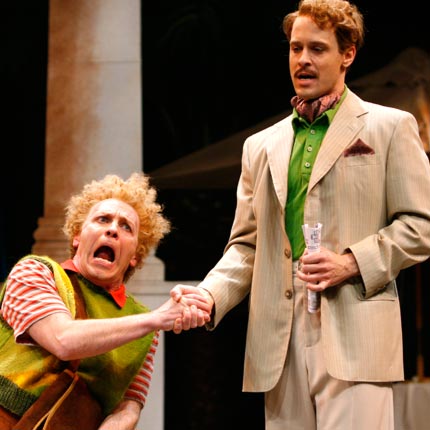I feel rather sorry for this guy, unable to derive a shred of pleasure from A Dance to the Music of Time and its minute observations from within of the English upper classes, even after shedding his Marxist convictions. I don’t imagine he’d care much for my current book A Legacy either: Sybille Bedford grew up and lived among the European aristocracy and cast a similarly cultivated eye on their wayss. Again he’d be missing the boat.
Powell and Bedford both look on their privileged bees and hives from a clear insider’s perspective, with all the understanding that implies and some of the sympathy. But they both also have plenty of ironic distance on these scenes and their absurdities. And they wouldn’t be successful satirists of the social scene if they didn’t also take seriously, and observe perceptively, the moral and emotional lives playing out within the teeming hive.
Bedford, a twentieth-century writer attending to a nineteenth-century scene, employs more ironic distance. She sends up her characters’ milieu and all their attendant mannerisms deliciously. One character is a bachelor living on the French Riviera who keeps pet monkeys that everyone speaks of as though they were badly behaved children, making the term “monkey” for a few pages ambiguous. His engagement to a young woman and visit to her starchy family in Berlin brings about the following passage that made me, a painfully self-conscious type, laugh out loud on the train to work yesterday about five separate times and again on the way out of the terminal.
Grandmama Merz eventually put two and two together.
“Is Melanie going to live in a house with monkeys?”
Fraulein von Tschernin, who had had a glimpse also of Julius, confirmed that this was part of her daughter’s radiant prospects.
“We’re not going to allow it,” said Grandmama.
“Herr Gehaimrat is fond of them too.”
“Monkeys are all right for bachelors,” said Grandpapa.
“I asked him whether he was going to have those brutes around for the rest of his life,” said Markwald; “and you know what he told me? Alas, very likely not, although they did live longer than dogs.”
“Dogs too?” said Grandmama.
“Flora’s Max brought one,” said Friedrich.
“Not in the house,” said Grandmama. “Flora told me.”
“What does one do with unwanted monkeys?” said Emil.
Grandmama pondered this. “He must give them away,” she said. “Hasn’t he any poor relations?”
An arrangement is eventually made with “a new kind of cageless zoo,” though Julius is “only just prevented from accepting the return present of a seal.”
The comedy is high when her view is long, but Bedford is just as canny when she gets up close to individual emotional life. The social, political, and historical forces that shape such life don’t care a fig for their victims–the novelist most adeptly makes this clear. But she cares herself.
The character we get closest to through the first three parts is Sarah, sister-in-law of the affianced Melanie, displacer of the monkeys. The following, roughly in regard to Sarah, is the sobering (or just numbing) perspective of having seen too much go by.
Tomorrow, and tomorrow, and tomorrow… Life, in the neat sad dry little French phrase that bundles it all into its place, Life is never as bad nor as good as one thinks. La vie, voyez-vous, ca n’est jamais si bon ni si mauvais qu’on croit. Never as bad, never as good… When? At the instant of calamity, at the edge of fear? when the bad news is brought, and the trap felt sprung, or the loss strikes home? At low ebb, in tedium, in accidie? In the moments of renewal? the transfiguration of love, the flush of work, the grace of a new vision, the long-held now? Or later, when the doors shut, one after another, and regret moves in the heart like a steel coil? Never as good, never as bad, but a drab, bearable, half-sleep banked by a little store of this and that, subsiding after visitations and alarms, a drowsing, often not uneasy, down the years, an even-paced irreversible passage–life, the run of lives, the sum of life? Is it consoling? Is it the whole truth? Is it inevitable?
A few pages later, this character is in love.

 Mrs. T and I took a few hard-earned days off and went to
Mrs. T and I took a few hard-earned days off and went to  Not only is “The Comedy of Errors” complicated to the max, but it also happens to be Shakespeare’s shortest play, thus giving smart directors plenty of room to make still more mischief. Ms. Gaines, for instance, has turned it into a play within a play: In her version, “The Comedy of Errors” is being filmed on an English soundstage during the Battle of Britain. The characters become caricatures of recognizable theatrical types–the pompous actor-peer, the promiscuous movie star, the American crooner turned Hollywood heart-throb–and the comic ante is upped when the War Ministry orders Shepperton Studios to wrap up the shoot in 48 hours.
Not only is “The Comedy of Errors” complicated to the max, but it also happens to be Shakespeare’s shortest play, thus giving smart directors plenty of room to make still more mischief. Ms. Gaines, for instance, has turned it into a play within a play: In her version, “The Comedy of Errors” is being filmed on an English soundstage during the Battle of Britain. The characters become caricatures of recognizable theatrical types–the pompous actor-peer, the promiscuous movie star, the American crooner turned Hollywood heart-throb–and the comic ante is upped when the War Ministry orders Shepperton Studios to wrap up the shoot in 48 hours. Now that the pending merger of
Now that the pending merger of